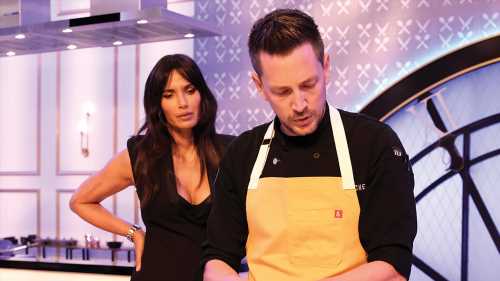Why ‘Top Chef’ Is Overdue for an Emmy Win After Season 20

“Top Chef” last won an Emmy in the competition category in 2010 (it won an editing Emmy in 2008) but it’s been shut out of wins for too many years.
Until “RuPaul’s Drag Race” took over the reality competition category, trophies tended to go to the most familiar — albeit well-crafted options — rather than the best shows.
Now, reality competition is, well, super competitive. Last year’s winner, “Lizzo’s Watch Out for the Big Grrrls,” was an empowering and joyful series that captured the mood of America, while nominees such as “Nailed It!,” and perpetual nominees “The Voice,” “The Amazing Race” and “RuPaul’s Drag Race” crowd out worthies such as “Making the Cut,” “Next in Fashion,” “American Ninja Warrior,” “Dancing With the Stars,” “America’s Got Talent” and any number of Gordon Ramsay cooking series. (For that matter, many Food Network series fail to make the cut as well.)
“Top Chef,” however, has consistently drawn “cheftestants” from the cream of the restaurant scene. From Season 1, it was instantly credible in the food world and made the most of having one of the best chefs in America — Tom Colicchio — onboard. That credibility, and its refusal to cast its participants in traditional, cartoonish reality show roles — villains, heroes — elevated the series, making it more intellectually stimulating.
Every season is a master class in cooking for the amateurs, and let’s face it, the professionals watching from home.
“Top Chef” was also a pioneer in inclusive casting. Gay, straight, BIPOC and everyone in-between who could handle themselves in the kitchen found a place on the show. That inclusiveness was reflected in food choices and preparation: Chefs from different backgrounds shared their stories, cooking techniques and flavors, educating the audience.
The show never talked down to its viewers either, instead inspiring audiences to try techniques seen on the series. In fact, “Top Chef” cookbooks are best-sellers, and the show has brought more fame to the worthy contestants and their restaurants across the country.
And like every great format, it’s been exported around the world.
Which brings us to the current season, the series’ 20th, an international affair built around an all-star format. The contestants have been culled from the winners and almost-winners from around the globe, and it’s set in the food capital of the world, London.
We learn about the chefs’ backstories, about how difficult it is being queer in some of their countries, the discrimination finalist Victoire Gouloubi, an immigrant from the war-torn Republic of Congo, endures in her adopted country, and the challenges and achievements of each chef.
The teachable moments continue beyond the chefs’ personal stories. Each Quickfire Challenge is constructed to reflect an aspect of a local food tradition, while Elimination Challenges work in local concerns about sustainability and other global issues.
But that’s not to say this show isn’t fun, and fun to watch. Chefs are mostly big personalities, so they tend to easily fill up the screen. They also provide commentary while they’re cooking, and the straight-to-camera confessionals always offer interesting tidbits about the art and science of cooking.
And while there’s the requisite amount of drama — it’s a TV show, after all — it never sinks to the levels of other popular Bravo franchises. This season will be beloved host Padma Lakshmi’s last — she’s never won a host Emmy despite 13 noms — another reason for voters to award this show that brings cultures together over food.
Read More About:
Source: Read Full Article